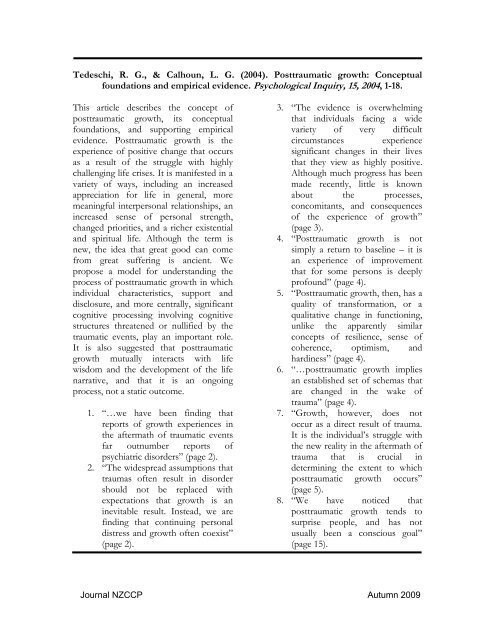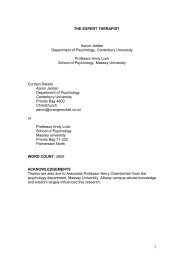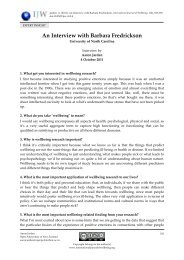Posttraumatic growth: an introduction and review. - Aaron Jarden
Posttraumatic growth: an introduction and review. - Aaron Jarden
Posttraumatic growth: an introduction and review. - Aaron Jarden
Create successful ePaper yourself
Turn your PDF publications into a flip-book with our unique Google optimized e-Paper software.
Tedeschi, R. G., & Calhoun, L. G. (2004). <strong>Posttraumatic</strong> <strong>growth</strong>: Conceptual<br />
foundations <strong>an</strong>d empirical evidence. Psychological Inquiry, 15, 2004, 1-18.<br />
This article describes the concept of<br />
posttraumatic <strong>growth</strong>, its conceptual<br />
foundations, <strong>an</strong>d supporting empirical<br />
evidence. <strong>Posttraumatic</strong> <strong>growth</strong> is the<br />
experience of positive ch<strong>an</strong>ge that occurs<br />
as a result of the struggle with highly<br />
challenging life crises. It is m<strong>an</strong>ifested in a<br />
variety of ways, including <strong>an</strong> increased<br />
appreciation for life in general, more<br />
me<strong>an</strong>ingful interpersonal relationships, <strong>an</strong><br />
increased sense of personal strength,<br />
ch<strong>an</strong>ged priorities, <strong>an</strong>d a richer existential<br />
<strong>an</strong>d spiritual life. Although the term is<br />
new, the idea that great good c<strong>an</strong> come<br />
from great suffering is <strong>an</strong>cient. We<br />
propose a model for underst<strong>an</strong>ding the<br />
process of posttraumatic <strong>growth</strong> in which<br />
individual characteristics, support <strong>an</strong>d<br />
disclosure, <strong>an</strong>d more centrally, signific<strong>an</strong>t<br />
cognitive processing involving cognitive<br />
structures threatened or nullified by the<br />
traumatic events, play <strong>an</strong> import<strong>an</strong>t role.<br />
It is also suggested that posttraumatic<br />
<strong>growth</strong> mutually interacts with life<br />
wisdom <strong>an</strong>d the development of the life<br />
narrative, <strong>an</strong>d that it is <strong>an</strong> ongoing<br />
process, not a static outcome.<br />
1. “…we have been finding that<br />
reports of <strong>growth</strong> experiences in<br />
the aftermath of traumatic events<br />
far outnumber reports of<br />
psychiatric disorders” (page 2).<br />
2. “The widespread assumptions that<br />
traumas often result in disorder<br />
should not be replaced with<br />
expectations that <strong>growth</strong> is <strong>an</strong><br />
inevitable result. Instead, we are<br />
finding that continuing personal<br />
distress <strong>an</strong>d <strong>growth</strong> often coexist”<br />
(page 2).<br />
3. “The evidence is overwhelming<br />
that individuals facing a wide<br />
variety of very difficult<br />
circumst<strong>an</strong>ces experience<br />
signific<strong>an</strong>t ch<strong>an</strong>ges in their lives<br />
that they view as highly positive.<br />
Although much progress has been<br />
made recently, little is known<br />
about the processes,<br />
concomit<strong>an</strong>ts, <strong>an</strong>d consequences<br />
of the experience of <strong>growth</strong>”<br />
(page 3).<br />
4. “<strong>Posttraumatic</strong> <strong>growth</strong> is not<br />
simply a return to baseline – it is<br />
<strong>an</strong> experience of improvement<br />
that for some persons is deeply<br />
profound” (page 4).<br />
5. “<strong>Posttraumatic</strong> <strong>growth</strong>, then, has a<br />
quality of tr<strong>an</strong>sformation, or a<br />
qualitative ch<strong>an</strong>ge in functioning,<br />
unlike the apparently similar<br />
concepts of resilience, sense of<br />
coherence, optimism, <strong>an</strong>d<br />
hardiness” (page 4).<br />
6. “…posttraumatic <strong>growth</strong> implies<br />
<strong>an</strong> established set of schemas that<br />
are ch<strong>an</strong>ged in the wake of<br />
trauma” (page 4).<br />
7. “Growth, however, does not<br />
occur as a direct result of trauma.<br />
It is the individual’s struggle with<br />
the new reality in the aftermath of<br />
trauma that is crucial in<br />
determining the extent to which<br />
posttraumatic <strong>growth</strong> occurs”<br />
(page 5).<br />
8. “We have noticed that<br />
posttraumatic <strong>growth</strong> tends to<br />
surprise people, <strong>an</strong>d has not<br />
usually been a conscious goal”<br />
(page 15).<br />
Journal NZCCP Autumn 2009





